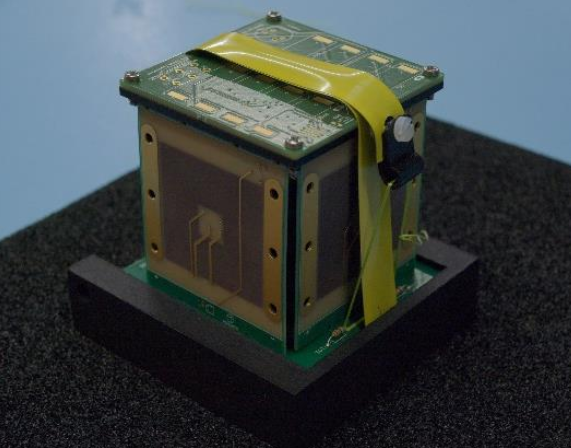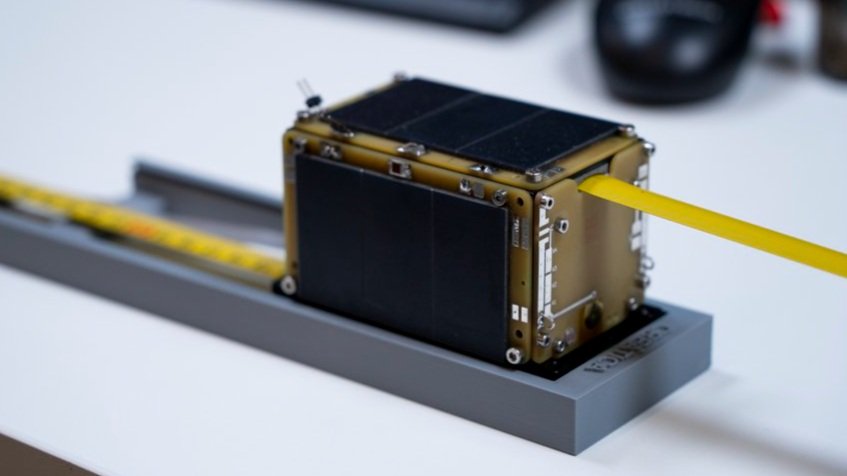
Alba Orbital is set to embark on its 8th orbital mission campaign, integrating seven PocketQube satellites from six different countries in preparation for their sold-out flight on-board SpaceX’s Transporter-12 Rideshare mission scheduled for lift off on a Falcon 9 rocket this October.
The satellites will be integrated into Alba Orbital’s PocketQube Deployer, ‘AlbaPod’, at their new facilities in Hillington Industrial Estate, Glasgow, the world’s first PocketQube factory. After integration, the cluster of pocket-sized satellites will be shipped out to SpaceX before hitching a ride to LEO.
PocketQubes are highly miniaturized satellites, typically 5 cm cubed per unit (‘P’), that can be launched to orbit for as little as 25K euros via Alba Orbital’s rideshare services. PocketQubes offer numerous advantages over traditional satellites. They are cost-effective, quicker to build, and provide versatile options for a variety of missions ranging from educational projects to advanced technological demonstrations.
Here’ are the PocketQube satellites manifested to fly on Alba Orbital’s 8th launch campaign:

SKYLINK-1 & SKYLINK-2 – Hello
Space, Türkiye:
SKYLINK-1 and SKYLINK-2 are the newest additions to Hello Space’s IoT Pico-satellite series. These identical 3P (5x5x15cm) PocketQubes operate together as part of a wider fleet of picosats, delivering global IoT data services via LoRaWAN network.
HYPE AGH – AGH University, Poland:
HYPE AGH is a 1P PocketQube by SatLab AGH, a student club from AGH University of Science and Technology in Krakow, and the first PocketQube from Poland. It features a UV-VIS spectroscope to analyze light pollution, volcanic ash, and forest degradation, plus a camera and OLED screen for “space selfies” with Earth in the background. This project offers students valuable experience and serves as a scientific and educational tool.

PROMETHEUS-1 – Universidade do Minho (Portugal), Instituto Superior Técnico (Port.), and Carnegie Mellon University (USA):
PROMETHEUS-1 is an open-source, 1P PocketQube developed by Universidade do Minho, Instituto Superior Técnico, and Carnegie Mellon University under the “PROMETHEUS” project. Funded by the Portuguese Foundation for Science and Technology, this initiative aims to enhance research and educational access to space.

POQUITO – Snt University of Luxembourg, Luxembourg:
“PocketQube for In Orbit Technology Operations” (POQUITO) is the first PocketQube mission by the Interdisciplinary Center of Security, Reliability, and Trust (SnT) at the University of Luxembourg. This tiny 5cm3 1P satellite hosts an even smaller 5×5×0.2 cm satellite the size of a computer chip. POQUITO aims to test inter-satellite communications between a PocketQube and a ‘Chipsat’ via LED in visible light and transmit a CW beacon to Earth to promote Luxembourgish space activities for radio amateurs.

HADES-R – Hydra Space Systems, Spain:
HADES-R (AKA ‘SmartSat’) is a 1.5p PocketQube by Hydra Space Systems S.L., and operated by AMSAT-EA. Its primary objectives are to serve as an FM repeater for global radio amateur communications and to test an experimental low-power graphene radiator payload developed by SmartIR, a spin-out from the University of Manchester’s Graphene Engineering Innovation Centre.

HYDRA-T – Hydra Space Systems, Spain:
HYDRA-T is a 1.5P PocketQube mission, also developed and operated by Madrid-based Hydra Space Systems and AMSAT-EA, that will offer commercial communication capabilities. This will be achieved by implementing an SDR based FM and FSK repeater. UHF and VHF bands will be used for downlink and uplink respectively. An educational payload is also included.
“Our team is thrilled to support an international array of PocketQubes, showcasing the diverse applications and innovations enabled by these small but powerful satellites,” said Tom Walkinshaw, CEO of Alba Orbital. “These missions not only highlights the advancements in satellite technology but also our commitment to making space more accessible and affordable.”
Alba Orbital (UK, USA, Germany) is the world’s leading PocketQube company that has delivered 41 pico-satellites on-orbit to date. Alba is a vertically integrated NewSpace company ‘democratising access to space’, providing turnkey solutions from advanced pico-satellite platforms, low-cost launch opportunities, and ground station services. Alba has worked with over 30 customers across three continents, including prestigious clients such as Stanford University, Carnegie Mellon University and TU Delft.
